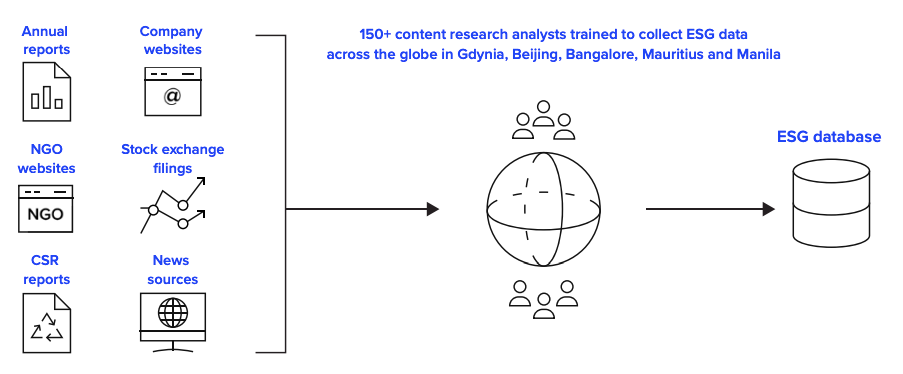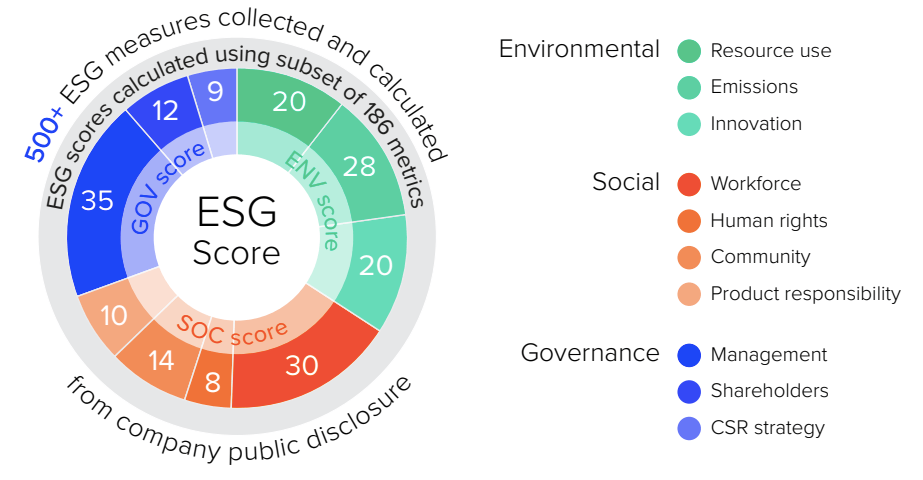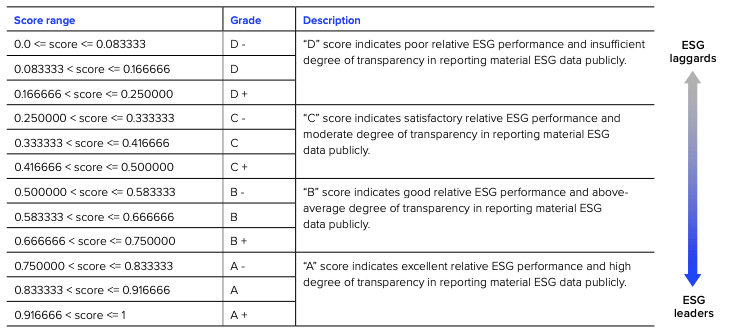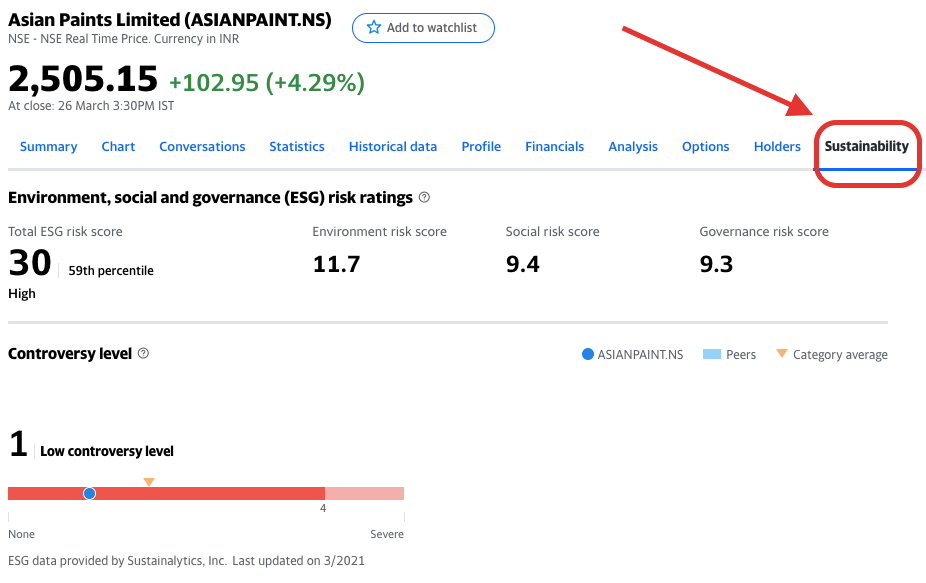ESG score of the company represents the sustainability of the business in terms of environment, social, and governance. The higher the ESG score better the sustainability of the company. In this article, I will tell you how to check ESG score for the company and what the score represents for the company?
I have already written a detailed article on what is ESG score and why it is important for the companies nowadays. But today, I will tell you how the score is being calculated and how to check ESG score by yourself.
What is ESG Score?
The ESG score of the company represents that how the company is responding in terms of environment, social, and governance while doing its business. These parameters are becoming more and more important as the whole world is now looking for sustainability alongside the business.
ESG score is the way of reporting company’s effort in terms of Environment, Social and Governance. This score is now becoming an integral part for the top management, stake holders, third party and public.
Research analyst are now integrating ESG score into portfolio analysis, equity research, screening and for quantitative analysis. The ESG score represents the transparency and measures company’s ESG performance.
How ESG Score is calculated?
The ESG score is the outcome of many parameters on which the company’s performance is being evaluated. The percentile rank scores are simple to understand (available in both percentages and letter grades from D- to A+).
There are rating agencies like Refinitiv, MSCI, S&P Global, and so on. These rating agencies will collect the data from the public domain and after processing and comparing it with its peer companies, the final ESG score is derived.
I will discuss the methodology of Refinitiv’s ESG score. Refinitiv offers one of the most comprehensive ESG databases in the industry, covering over 70% of the global market cap, across more than 500 different ESG metrics, with a history dating back to 2002.
The ESG score covers 10 main themes like emissions, environmental product innovation, human rights, shareholders, and so on. The scores are based on the relative performance of ESG factors with the company’s sector (for environmental and social) and country of incorporation (for governance).
Below are the key factors through which the ESG score is calculated.
- Unique ESG magnitude (materiality) weightings
- Transparency stimulation
- ESG controversies overlay
- Industry and country benchmarks at the data point scoring
- Percentile rank scoring methodology

Data Collection and Processing
There is a lot of work to be done for data collection and processing the collected data. The data is collected from various publicly available information sources to provide up-to-date information of the company. There are over 500 ESG measures for which the data are being processed. The database is updated on a continuous basis – aligned with corporate reporting patterns – and data is refreshed on products every week, including the recalculation of the ESG scores.

The data has been collected from number of sources and processed into a common format. The processed data is then plotted against the set parameters to derive the ESG score. All the parameters are divided into main 3 segments i.e. Environment, Social & Governance. The main score is then derive from the subset of these 500+ parameters.

ESG Score
captures and calculates over 500 company-level ESG measures, of which a subset of 186 (details in the ESG glossary, available on request) of the most comparable and material per industry, power the overall company assessment and scoring process.
These are grouped into 10 categories that reformulate the three
pillar scores and the final ESG score, which is a reflection of the company’s ESG performance, commitment and effectiveness based on publicly reported information.
The category scores are rolled up into three pillar scores – environmental, social and corporate governance. The ESG pillar score is a relative sum of the category weights, which vary per industry for the environmental and social categories.
For governance, the weights remain the same across all industries. The pillar weights are normalised to percentages ranging between 0 and 100.
ESG Controversy Score
ESGC scores provide a rounded and comprehensive scoring of a company’s ESG performance, based on the reported information pertaining to the ESG pillars, with the ESG controversies overlay captured from global media sources.
The main objective of this score is to discount the ESG performance score based on negative media stories. It does this by incorporating the impact of significant, material ESG controversies in the overall ESGC score.
When companies are involved in ESG controversies, the ESGC score is calculated as the weighted average of the ESG scores and ESG controversies score per fiscal period, with recent controversies reflected in the latest completed period.
When companies are not involved in ESG controversies, the ESGC score is equal to the ESG score.
Final ESG score & Grade
The conversion from a percentile score to a letter grade is based on the logic in the table below.

How to Check ESG Score of the Company?
The ESG score for the particular company can be find on the Yahoo Finance website. Follow below steps to find out the ESG score (sustainability score) of the company.
- Go to Yahoo Finance’s website
- Search for the company name you want to check the ESG score
- Go to the last tab ‘Sustainability’
- You will find the ESG score of the particular company

You can see the total ESG score on the left side. Besides that score, there are individual Environmental Social and Governance score given. Total score is the sum of all these 3 individual score.
If you can’t find any ESG score on this tab, that means the ESG score for that particular company is not available at this time. The score will be updated as and when available.
Additionally, there are several ESG rating agencies that provide ESG scores for Indian companies. Some popular ESG rating agencies for Indian companies include MSCI ESG, Sustainalytics, and RobecoSAM.
To check the ESG score of an Indian company using MSCI ESG, follow these steps:
- Visit the MSCI ESG website (https://www.msci.com/esg-fundamentals) and click on “ESG Fundamentals.”
- Click on “Search for Company” and enter the name of the Indian company you want to check the ESG score for.
- Once you find the company, click on its name to view its ESG score and rating.
To check the ESG score of an Indian company using Sustainalytics, follow these steps:
- Visit the Sustainalytics website (https://www.sustainalytics.com/esg-ratings/) and click on “ESG Ratings.”
- Click on “Search for Company” and enter the name of the Indian company you want to check the ESG score for.
- Once you find the company, click on its name to view its ESG score and rating.
To check the ESG score of an Indian company using RobecoSAM, follow these steps:
- Visit the RobecoSAM website (https://www.robecosam.com/en/sustainability-insights/about-sustainability/sustainability-scores.jsp) and click on “Sustainability Scores.”
- Click on “Search for Company” and enter the name of the Indian company you want to check the ESG score for.
- Once you find the company, click on its name to view its ESG score and rating.
Keep in mind that different ESG rating agencies may use different methodologies and criteria to calculate ESG scores, so the scores and ratings may vary between agencies.
ESG Score – FAQs
ESG Score represents the company’s sustainability for doing business and its social responsibility. This score tells you whether the company is practicing fair business process or not.
The ESG score for the company is updated on a weekly basis.
There are chances that ESG score for the particular company is currently not available. ESG scores are being calculated and updated by various agencies on a regular basis. The company for which you are looking ESG score for is still not being evaluated for ESG parameters.
Wait for sometime and check it after some time the ESG score may be available in the future for that particular company.
Yes, the higher ESG score means company is abiding the various environmental and socio-economic laws laid by the government. It also reflects the ethics and overall management transparency of the company.
Well, you should not invest in the company only because it’s ESG score is high. There are various other parameters you must consider before making your investment decision.
Conclusion:
ESG score is becoming a new parameters while making investment decision. But you should not put all your focus and energy on this score. This is just an indicator of how the company is doing in terms of sustainability and fair business practices.


The higher the ESG, the less I’ll trust a company.
Why so?